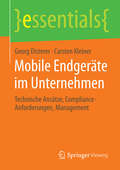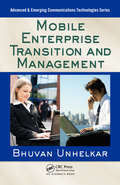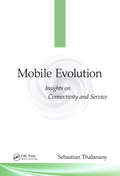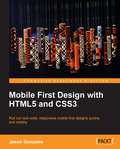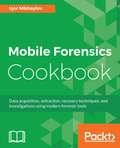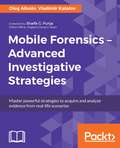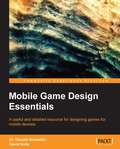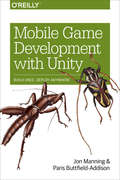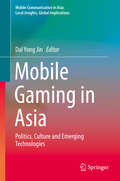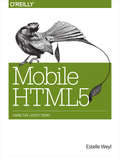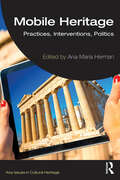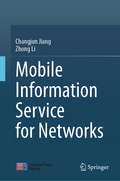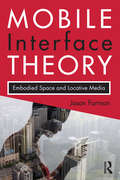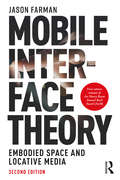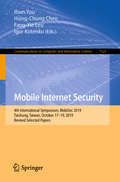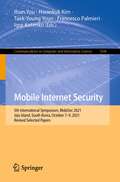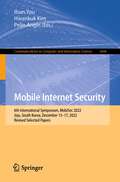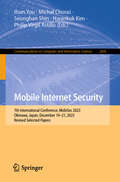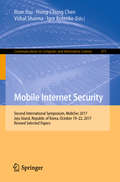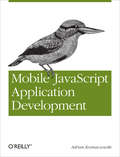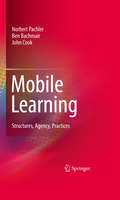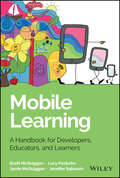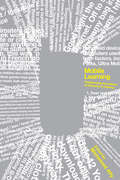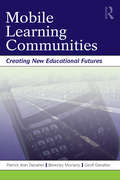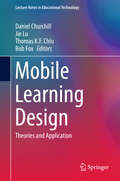- Table View
- List View
Mobile Endgeräte im Unternehmen: Technische Ansätze, Compliance-Anforderungen, Management (essentials)
by Georg Disterer Carsten KleinerMobile Endgeräte wie Smartphones und Tablets versprechen zugleich einen großen Benutzerkomfort und einen hohen betrieblichen Nutzen. Deshalb nimmt deren Einsatz in Unternehmen stark zu, die Nutzung von E-Mail sowie elektronischen Kontakten und Terminen kann als Standard angesehen werden. Darüber hinaus gibt es für die Einsatzart und die technische An- und Einbindung mobiler Endgeräte verschiedene Möglichkeiten mit unterschiedlichen Vor- und Nachteilen. Etablierte organisatorische und technische Sicherheitsmaßnahmen können oft nicht greifen, da sich die mobilen Geräte - im Unterschied zu klassischen stationären Geräten - nicht in den Räumen der Unternehmen befinden und über öffentliche Kanäle und Netze kommunizieren. Daher stellt die Einbindung mobiler Endgeräte in die betriebliche Informationsverarbeitung eine Herausforderung an das IT-Management dar.
Mobile Enterprise Transition and Management (Advanced & Emerging Communications Technologies)
by Bhuvan UnhelkarAddressing the rapid evolution of global communications, this book provides step-by-step guidance on how to configure, enact, and manage the process of integrating mobile technology within an organization. The mobile enterprise transition (MET) process presented considers input from the four significant dimensions of an organization - economic, technical, process, and social - making it a well-rounded and complete process. Based on extensive research, literature review, and practical experimentation, this comprehensive text presents emerging best practices, exhaustive case studies, and examples of successful transitions. It also provides detailed references, and a glossary of key terms and commonly used acronyms.
Mobile Evolution: Insights on Connectivity and Service
by Sebastian ThalananyThis book presents insights, interpretations, concepts, and interdependent views-in the landscape of mobile connectivity and service-that emphasize the significance of a harmonious interplay, cooperation, and coalescing of a variety of interdisciplinary domains of science and art. Mobile Evolution: Insights on Connectivity and Service explores the forward-looking and enabling capabilities of mobile connectivity and service in the context of long term evolution (LTE) systems and multimedia services, as viewed through a lens of human experience. It provides information and guidelines pertaining to the strategies and technologies associated with the next-generation mobile ecosystem.
Mobile First Design with HTML5 and CSS3
by Jason GonzalezA user friendly tutorial to develop websites that work for both small and large screens using HTML5 and CSS3.This book is for beginner to intermediate developers and designers, as well as for those in management who want to understand what is possible with modern tools and strategies on the Web.
Mobile Forensics Cookbook
by Igor MikhaylovDiscover the tools and techniques of mobile forensic investigations and make sure your mobile autopsy doesn't miss a thing, all through powerful practical recipes About This Book • Acquire in-depth knowledge of mobile device acquisition using modern forensic tools • Understand the importance of clouds for mobile forensics and learn how to extract data from them • Discover advanced data extraction techniques that will help you to solve forensic tasks and challenges Who This Book Is For This book is aimed at practicing digital forensics analysts and information security professionals familiar with performing basic forensic investigations on mobile device operating systems namely Android, iOS, Windows, and Blackberry. It's also for those who need to broaden their skillset by adding more data extraction and recovery techniques. What You Will Learn • Retrieve mobile data using modern forensic tools • Work with Oxygen Forensics for Android devices acquisition • Perform a deep dive analysis of iOS, Android, Windows, and BlackBerry Phone file systems • Understand the importance of cloud in mobile forensics and extract data from the cloud using different tools • Learn the application of SQLite and Plists Forensics and parse data with digital forensics tools • Perform forensic investigation on iOS, Android, Windows, and BlackBerry mobile devices • Extract data both from working and damaged mobile devices using JTAG and Chip-off Techniques In Detail Considering the emerging use of mobile phones, there is a growing need for mobile forensics. Mobile forensics focuses specifically on performing forensic examinations of mobile devices, which involves extracting, recovering and analyzing data for the purposes of information security, criminal and civil investigations, and internal investigations. Mobile Forensics Cookbook starts by explaining SIM cards acquisition and analysis using modern forensics tools. You will discover the different software solutions that enable digital forensic examiners to quickly and easily acquire forensic images. You will also learn about forensics analysis and acquisition on Android, iOS, Windows Mobile, and BlackBerry devices. Next, you will understand the importance of cloud computing in the world of mobile forensics and understand different techniques available to extract data from the cloud. Going through the fundamentals of SQLite and Plists Forensics, you will learn how to extract forensic artifacts from these sources with appropriate tools. By the end of this book, you will be well versed with the advanced mobile forensics techniques that will help you perform the complete forensic acquisition and analysis of user data stored in different devices. Style and approach This book delivers a series of extra techniques and methods for extracting and analyzing data from your Android, iOS, Windows, and Blackberry devices. Using practical recipes, you will be introduced to a lot of modern forensics tools for performing effective mobile forensics.
Mobile Forensics: Advanced Investigative Strategies
by Oleg Afonin Vladimir KatalovMaster powerful strategies to acquire and analyze evidence from real-life scenariosAbout This BookA straightforward guide to address the roadblocks face when doing mobile forensicsSimplify mobile forensics using the right mix of methods, techniques, and toolsGet valuable advice to put you in the mindset of a forensic professional, regardless of your career level or experienceWho This Book Is ForThis book is for forensic analysts and law enforcement and IT security officers who have to deal with digital evidence as part of their daily job. Some basic familiarity with digital forensics is assumed, but no experience with mobile forensics is required.What You Will LearnUnderstand the challenges of mobile forensicsGrasp how to properly deal with digital evidenceExplore the types of evidence available on iOS, Android, Windows, and BlackBerry mobile devicesKnow what forensic outcome to expect under given circumstancesDeduce when and how to apply physical, logical, over-the-air, or low-level (advanced) acquisition methodsGet in-depth knowledge of the different acquisition methods for all major mobile platformsDiscover important mobile acquisition tools and techniques for all of the major platformsIn DetailInvestigating digital media is impossible without forensic tools. Dealing with complex forensic problems requires the use of dedicated tools, and even more importantly, the right strategies. In this book, you'll learn strategies and methods to deal with information stored on smartphones and tablets and see how to put the right tools to work.We begin by helping you understand the concept of mobile devices as a source of valuable evidence. Throughout this book, you will explore strategies and "plays" and decide when to use each technique. We cover important techniques such as seizing techniques to shield the device, and acquisition techniques including physical acquisition (via a USB connection), logical acquisition via data backups, over-the-air acquisition. We also explore cloud analysis, evidence discovery and data analysis, tools for mobile forensics, and tools to help you discover and analyze evidence.By the end of the book, you will have a better understanding of the tools and methods used to deal with the challenges of acquiring, preserving, and extracting evidence stored on smartphones, tablets, and the cloud.
Mobile Game Design Essentials
by Dr Claudio Scolastici David NolteA step-by-step guide.This book is for all game developers, designers, and hobbyists who want to create assets for mobile games
Mobile Game Development with Unity: Build Once, Deploy Anywhere
by Paris Buttfield-Addison Jonathon ManningDo you want to build mobile games, but lack game development experience? No problem. This practical guide shows you how to create beautiful, interactive content for iOS and Android devices with the Unity game engine.Authors Jon Manning and Paris Buttfield-Addison (iOS Swift Game Development Cookbook) provide a top-to-bottom overview of Unity’s features with specific, project-oriented guidance on how to use them in real game situations. Over the course of this book, you’ll learn hands-on how to build 2D and 3D games from scratch that will hook and delight players. If you have basic programming skills, you’re ready to get started.Explore the basics of Unity, and learn how to structure games, graphics, scripting, sounds, physics, and particle systemsUse 2D graphics and physics features to build a side-scrolling action gameCreate a 3D space combat simulator with projectile shooting and respawning objects, and learn how to manage the appearance of 3D modelsDive into Unity’s advanced features, such as precomputed lighting, shading, customizing the editor, and deployment
Mobile Gaming in Asia
by Dal Yong JinThis book analyzes mobile gaming in the Asian context and looks into a hitherto neglected focus of inquiry - a localized mobile landscape, with particular reference to young Asians' engagement with mobile gaming. This edition focuses not only on the remarkable success of local mobile games, but also on the significance of social milieu in the development of Asian mobile technologies and gaming culture. It analyzes the growth of the current mobile technologies and mobile gaming not as separate but as continuous developments in tandem with the digital economy. It is of interest to both academics and a broader readership from the business, government, and information technology sectors
Mobile HTML5: Using the Latest Today
by Estelle WeylBuild kickass websites and applications for all mobile (and non-mobile) platforms by adding HTML5 and CSS3 to your web development toolkit. With this hands-on book, you’ll learn how to develop web apps that not only work on iOS, Android, Blackberry, and Windows Phone, but also perform well and provide good user experience.With lots of code and markup examples, you’ll learn best practices for using HTML5 features, including new web forms, SVG, Canvas, localStorage, and related APIs. You’ll also get an in-depth look at CSS3, and discover how to design apps for large monitors and tiny screens alike.Learn HTML5’s elements, syntax, and semanticsBuild forms that provide enhanced usability with less JavaScriptExplore HTML5 media APIs for graphics, video, and audioEnable your applications to work offline, using AppCache, localStorage, and other APIsLearn what you need to know about CSS3 selectors and syntaxDive into CSS3 features such as multiple backgrounds, gradients, border-images, transitions, transforms, and animationsMake your web applications usable, responsive, and accessible.Design for performance, user experience, and reliability on all platforms
Mobile Heritage: Practices, Interventions, Politics (Key Issues in Cultural Heritage)
by Ana-Maria HermanMobile Heritage explores how diverse digital technologies (such as apps, GPS, games, social platforms, NFTs, drones, AR, MR and AI, among others) have allowed for new types of mobilities and introduced a novel set of practices, interventions, and politics for heritage collections, archives, exhibitions, entertainment, conservation, management, commerce, education, restitution, activism, and regulation.The volume is not a ‘how to’ book. Instead, it critically examines this emerging landscape and its unsettling of existing relations between heritage and knowledge, value, identity, power, sense of place, community, nationhood, and ownership – thus outlining a new set of issues, implications, and consequences. The volume brings together case studies from around the world and each chapter considers mobility matters associated with tangible and intangible cultural heritage (relating to art, film, music, games, manuscripts, traditional knowledge, architecture, cities, and more) and the involvement of a variety of actors in digital heritage practices and interventions (such as artists, activists, communities, museums, non-profit organisations, educational institutions, enterprises and governmental agencies). The contributors are scholars and practitioners drawing on various disciplines and fields of study, including archaeology, museum studies, media studies, computing, art history, cultural studies, anthropology, gender studies, mobility studies, and law.Mobile Heritage positions mobility as a critical tool for understanding the changing (digital) heritage landscape, making this volume an essential read for students, academics, and practitioners engaged in this area.
Mobile Information Service for Networks
by Zhong Li Changjun JiangThis book introduces readers to mobile information services for networks. The content is divided into eight chapters, each of which presents a specific concept and the latest related developments in mobile information services. Mobile information services for networks can be defined as platform-independent functional entities that provide various services based on the communication network platform. The book discusses the three main supporting technologies for mobile information services: neighbor discovery in the data link layer; routing and balanced association in the network layer; and community structure detection in the application layer. Lastly, the book describes the development of applications based on the authors’ mobile information service platform, as well as related key technologies in the domains of intelligent transportation, smart tourism, and mobile payment, such as trajectory analysis, location recommendation, and mobile behavior authentication, which are promoting the development of mobile information services. This book offers a valuable reference guide for researchers in the field of computer science and technology, as well as those in the field of network mobile information service technology.
Mobile Interface Theory: Embodied Space and Locative Media
by Jason FarmanMobile media – from mobile phones to smartphones to netbooks – are transforming our daily lives. We communicate, we locate, we network, we play, and much more using our mobile devices. In Mobile Interface Theory, Jason Farman demonstrates how the worldwide adoption of mobile technologies is causing a reexamination of the core ideas about what it means to live our everyday lives. He argues that mobile media’s pervasive computing model, which allows users to connect and interact with the internet while moving across a wide variety of locations, has produced a new sense of self among users – a new embodied identity that stems from virtual space and material space regularly enhancing, cooperating or disrupting each other. Exploring a range of mobile media practices – including mobile maps and GPS technologies, location-aware social networks, urban and alternate reality games that use mobile devices, performance art, and storytelling projects – Farman illustrates how mobile technologies are changing the ways we produce lived, embodied spaces.
Mobile Interface Theory: Embodied Space and Locative Media
by Jason FarmanIn this updated second edition, Jason Farman offers a groundbreaking look at how location-aware mobile technologies are radically shifting our sense of identity, community, and place-making practices. Mobile Interface Theory is a foundational book in mobile media studies, with the first edition winning the Book of the Year Award from the Association of Internet Researchers. It explores a range of mobile media practices from interface design to maps, AR/VR, mobile games, performances that use mobile devices, and mobile storytelling projects. Throughout, Farman provides readers with a rich theoretical framework to understand the ever-transforming landscape of mobile media and how they shape our bodily practices in the spaces we move through. This fully updated second edition features updated examples throughout, reflecting the shifts in mobile technology. This is the ideal text for those studying mobile media, social media, digital media, and mobile storytelling.
Mobile Internet Security: 4th International Symposium, MobiSec 2019, Taichung, Taiwan, October 17–19, 2019, Revised Selected Papers (Communications in Computer and Information Science #1121)
by Ilsun You Igor Kotenko Fang-Yie Leu Hsing-Chung ChenThis book constitutes the refereed proceedings of the 4th International Symposium on Mobile Internet Security, MobiSec 2019, held in Taichung, Taiwan, in October 2019.The 13 revised full papers presented were carefully reviewed and selected from 44 submissions. The papers are organized in the topical sections: mobile internet security; mobile application and security; vehicular network security; deep learning applications.
Mobile Internet Security: 5th International Symposium, MobiSec 2021, Jeju Island, South Korea, October 7–9, 2021, Revised Selected Papers (Communications in Computer and Information Science #1544)
by Ilsun You Francesco Palmieri Igor Kotenko Hwankuk Kim Taek-Young YounThis book constitutes the refereed proceedings of the 5th International Symposium on Mobile Internet Security, MobiSec 2021, held in Jeju Island, Republic of Korea, in October 2021.The 28 revised full papers presented were carefully reviewed and selected from 66 submissions. The papers are organized in the topical sections: IoT and cyber security; blockchain security; digital forensic and malware analysis; 5G virtual Infrastructure, cryptography and network security.
Mobile Internet Security: 6th International Symposium, MobiSec 2022, Jeju, South Korea, December 15–17, 2022, Revised Selected Papers (Communications in Computer and Information Science #1644)
by Ilsun You Hwankuk Kim Pelin AnginThis book constitutes the refereed proceedings of the 6th International Conference on Mobile Internet Security, MobiSec 2022, held in Jeju, South Korea, in December 15–17, 2022.The 24 full papers included in this book were carefully reviewed and selected from 60 submissions. They were organized in topical sections as follows: 5G advanced and 6G security; AI for security; cryptography and data security; cyber security; and IoT application and blockchain security.
Mobile Internet Security: 7th International Conference, MobiSec 2023, Okinawa, Japan, December 19–21, 2023, Revised Selected Papers (Communications in Computer and Information Science #2095)
by Ilsun You Michał Choraś Hwankuk Kim Seonghan Shin Philip Virgil AstilloThis book constitutes the refereed post-proceedings of the 7th International Conference on Mobile Internet Security, MobiSec 2023, held in Okinawa, Japan, in December 19–21, 2023. The 21 full papers presented were carefully reviewed and selected from 70 submissions. The papers are organized in the following topical sections: 5G and 6G security; cryptography; machine learning-based security; identification and authentication; network design and security.
Mobile Internet Security: First International Symposium, Mobisec 2016, Taichung, Taiwan, July 14-15, 2016, Revised Selected Papers (Communications in Computer and Information Science #797)
by Ilsun You Vishal Sharma Igor Kotenko Hsing-Chung ChenThis book constitutes the refereed proceedings of the First International Symposium on Mobile Internet Security, MobiSec 2017, held in Jeju Island, Republic of Korea, in October 2017. <P><P>The 13 revised full papers along with a short paper presented were carefully reviewed and selected from 44 submissions. They are closely related to various theories and practical applications in mobility management to highlight the state-of-the-art research.
Mobile JavaScript Application Development: Bringing Web Programming to Mobile Devices
by Adrian KosmaczewskiWhen developing apps for the latest smartphones, you’re faced with several vexing questions. How many platforms do you need to accommodate? What level of support do mobile browsers provide? To help you address these and many other key issues, this guide provides a hands-on tour of the most powerful JavaScript frameworks available today.You’ll build sample apps with jQuery Mobile, Sencha Touch, and PhoneGap to learn the unique advantages—and disadvantages—of each framework. From there, you can determine which one is best for your project. This book is ideal for web developers familiar with JavaScript, HTML, and CSS.Experience the simplicity of jQuery Mobile for building cross-browser applicationsLearn how Sencha Touch’s architecture, widgets, and blazing-fast rendering engine makes it a good choice for enterprise softwareUse PhoneGap to package your web app into a native iOS, Android, or Windows Phone applicationDiscover the impact of various HTML5 features on mobile app developmentPick up JavaScript productivity tips as you delve into its object orientation, closures, and coding conventionsTest and debug your app with a collection of tips, tricks, and tools
Mobile Learning
by Gunther Kress Norbert Pachler Ben Bachmair John CookAs with television and computers before it, today's mobile technology challenges educators to respond and ensure their work is relevant to students. What's changed is that this portable, cross-contextual way of engaging with the world is driving a more proactive approach to learning on the part of young people. The first full-length authored treatment of the relationship between the centrality of technological development in daily life and its potential as a means of education, Mobile Learning charts the rapid emergence of new forms of mass communication and their potential for gathering, shaping, and analyzing information, studying their transformative capability and learning potential in the contexts of school and socio-cultural change. The focus is on mobile/cell phones, PDAs, and to a lesser extent gaming devices and music players, not as "the next new thing" but meaningfully integrated into education, without objectifying the devices or technology itself. And the book fully grounds readers by offering theoretical and conceptual models, an analytical framework for understanding the issues, recommendations for specialized resources, and practical examples of mobile learning in formal as well as informal educational settings, particularly with at-risk students. Among the topics covered: * Core issues in mobile learning * Mobile devices as educational resources * Socioeconomic approaches to mobile learning * Creating situations that promote mobile learning * Ubiquitous mobility and its implications for pedagogy * Bridging the digital divide at the policy level Mobile Learning is a groundbreaking volume, sure to stimulate both discussion and innovation among educational professionals interested in technology in the context of teaching and learning.
Mobile Learning
by Jamie Mcquiggan Lucy Kosturko Jennifer Sabourin Scott McquigganExplore the game-changing technology that allows mobile learning to effectively reach K-12 students Mobile Learning: A Handbook for Developers, Educators and Learners provides research-based foundations for developing, evaluating, and integrating effective mobile learning pedagogy. Twenty-first century students require twenty-first century technology, and mobile devices provide new and effective ways to educate children. But with new technologies come new challenges--therefore, this handbook presents a comprehensive look at mobile learning by synthesizing relevant theories and drawing practical conclusions for developers, educators, and students. Mobile devices--in ways that the laptop, the personal computer, and netbook computers have not--present the opportunity to make learning more engaging, interactive, and available in both traditional classroom settings and informal learning environments. From theory to practice, Mobile Learning explores how mobile devices are different than their technological predecessors, makes the case for developers, teachers, and parents to invest in the technology, and illustrates the many ways in which it is innovative, exciting, and effective in educating K-12 students. Explores how mobile devices can support the needs of students Provides examples, screenshots, graphics, and visualizations to enhance the material presented in the book Provides developers with the background necessary to create the apps their audience requires Presents the case for mobile learning in and out of classrooms as early as preschool Discusses how mobile learning enables better educational opportunities for the visually impaired, students with Autism, and adult learners. If you're a school administrator, teacher, app developer, or parent, this topical book provides a theoretical, well-researched discussion of the pedagogical theory and mobile learning, as well as practical advice in setting up a mobile learning strategy.
Mobile Learning Communities: Creating New Educational Futures
by Geoff Danaher Patrick Alan Danaher Beverley MoriartyMobile Learning Communities explores the diverse ways in which traveling groups experience learning ‘on the run’. This book provides empirical evidence that draws on the authors’ 17 years of continuing research with international occupational Travelers. It engages with themes such as workplace learning, globalization, multiliteracies, and emerging technologies which impinge on the ways mobile groups make sense of themselves as learning communities. International in focus, this book deals with an issue of increasing global significance and shows the complexities of the lives and learning experiences of such mobile cultures and their strategies for earning, learning, and living, thus challenging simplistic and stereotypical images of traveling groups still found in mainstream media and popular culture. Mobile Learning Communities brings together for the first time mobilities and learning communities into a single and comprehensive focus. It provides a detailed analysis of how mobile groups position themselves and how they are positioned by others. This text will appeal to scholars in the field of distance education and educational technology and to researchers in education, cultural studies, and sociology. It will also be of interest to educational instructors, policy-makers, and administrators, as well as teacher educators and pre-service teachers. It paints a vivid picture of the experience of mobility through the words of the mobile learners themselves, but also critiques existing notions of learning and suggests ways of creating new educational futures for all learners and educators.
Mobile Learning Design
by Bob Fox Daniel Churchill Jie Lu Thomas K.F. ChiuThis book focuses on mobile learning design from both theoretical and practical perspectives. It introduces and discusses how mobile learning can be effectively integrated into curricula, highlighting the design of four key components of learning-centric pedagogy: Resource, Activity, Support and Evaluation in the context of mobile learning. It also investigates the learning theories underpinning mobile learning design, and includes case studies in different contexts. It provides practical insights that allow teachers to change and transform teaching practices using mobile technology. Anyone involved in mobile-technology enhanced learning and teaching will find this book both informative and useful.
